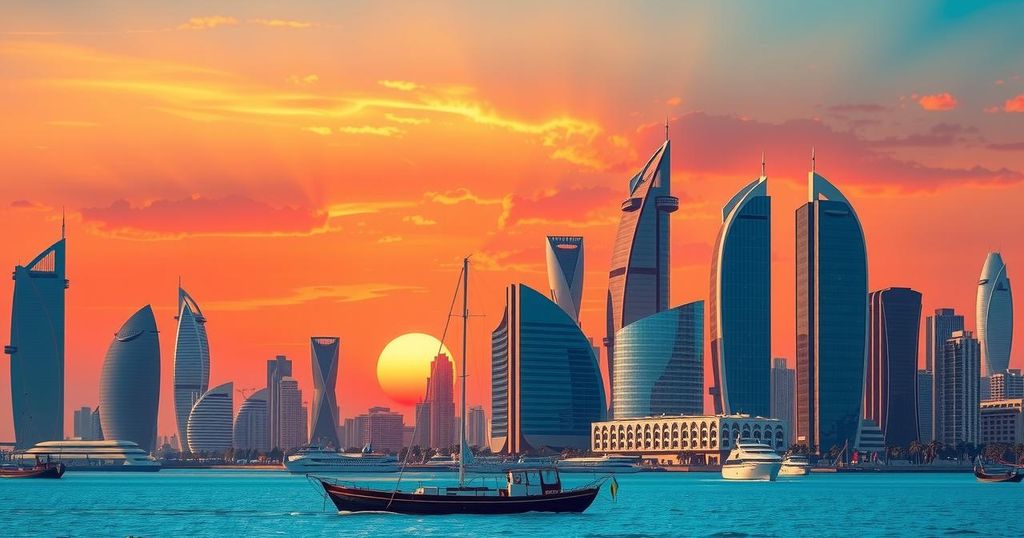Global news
ASIA, DIPLOMACY, EAST, EUROPE, FINANCE COMMITTEE, FOREIGN POLICY, GAZA, GAZA STRIP, GULF, INSTITUTE, JAMAL KHASHOGGI, JARED, JEDDAH, LIPPMAN, MBS, MIDDLE EAST, NORTH AMERICA, OVAL OFFICE, RI, SAUDI ARABIA, THOMAS LIPPMAN, UKRAINE, UNITED STATES, VISION 2030, VOLODYMYR ZELENSKYY, WASHINGTON, WASHINGTON POST
Fatima Khan
0 Comments
Saudi Arabia’s Diplomatic Transformation: From Pariah to Mediator
Saudi Arabia is repositioning itself from a pariah state to a key global mediator through diplomatic initiatives, including a summit with U.S. and Ukrainian leaders. Crown Prince Mohammed bin Salman is at the helm of this transformation, seeking to enhance its international standing despite ongoing human rights challenges. The kingdom aims to become a significant player in global affairs while navigating its complex relationship with U.S. politics.
Saudi Arabia is making concerted efforts to transform its global image from being perceived as a pariah to becoming a vital mediator in international conflicts. This endeavor includes hosting a significant summit featuring Secretary of State Marco Rubio and Ukrainian President Volodymyr Zelenskyy, highlighting the kingdom’s newfound diplomatic stature. Historically, the kingdom has been characterized by its authoritarian governance and a poor human rights record, but under Crown Prince Mohammed bin Salman, or MBS, there is a strategic push to rehabilitate its global standing.
Crown Prince Mohammed bin Salman is at the forefront of this image overhaul, working to position Saudi Arabia as a forward-thinking entity engaged in diplomacy, commerce, and cultural events. The recent summit in Jeddah reflects this initiative, aiming to establish Saudi Arabia not only as a regional influencer but also as a significant player in solving global challenges. Thomas Lippman of the Middle East Institute noted that, “This is a new Saudi Arabia — better educated, well-traveled and more open to ideas than in the past.”
The kingdom’s diplomacy extends beyond simple engagements; it has also facilitated critical talks between the U.S. and Russia and brought Arab leaders together for key discussions. Analysts suggest that Saudi Arabia is working to reshape itself as an alternative meeting place for major diplomatic negotiations, aiming to rival established venues like Geneva and Vienna. In tandem with its global aspirations, Saudi Arabia’s Vision 2030 initiative seeks economic diversification beyond oil through vast infrastructure projects and a burgeoning entertainment sector.
Despite significant strides in modernizing aspects of society, including reforms granting women greater freedoms, Saudi Arabia still grapples with a legacy of human rights abuses. The U.S. State Department’s reports highlight ongoing concerns such as unlawful killings and suppression of dissent. Rayan Alyusufi, a Saudi student currently studying in England, noted, “Anyone who has visited the country recently can easily notice significant improvements in human rights,” although these advancements are often overshadowed by persistent issues.
Consequently, the relationship between the Saudi leadership and U.S. political figures remains complex, particularly given investments like the controversial $2 billion from the kingdom into a fund associated with Jared Kushner, former President Trump’s son-in-law. Critics have raised concerns over potential conflicts of interest. Jon Alterman from the Center for Strategic and International Studies observed that Saudi Arabia, akin to China in strategic importance, is acknowledged as a crucial global actor despite its domestic governance issues.
In summary, Saudi Arabia is actively pursuing a transformation of its international reputation, aiming to be recognized as a diplomatic powerhouse amid its troubled history. Under the leadership of Crown Prince Mohammed bin Salman, the kingdom is engaging more in global affairs while attempting to address its human rights concerns. While notable reforms have occurred, the effectiveness of these changes in fundamentally shifting perceptions about the nation remains to be seen, necessitating a careful balancing act as it seeks a more substantial role on the world stage.
Original Source: www.nbcnews.com




Post Comment